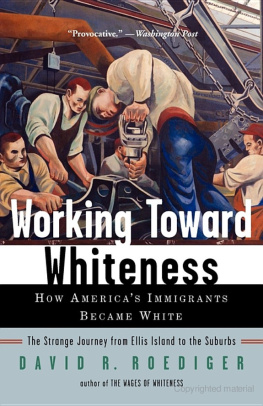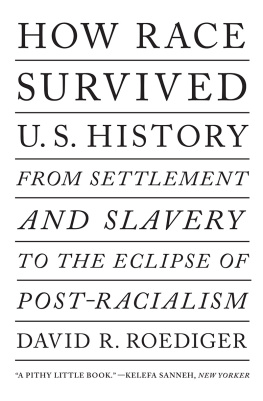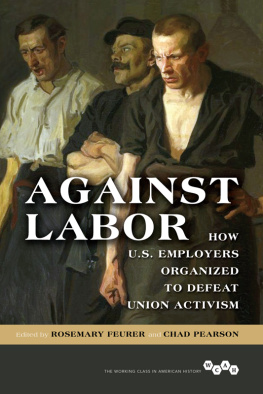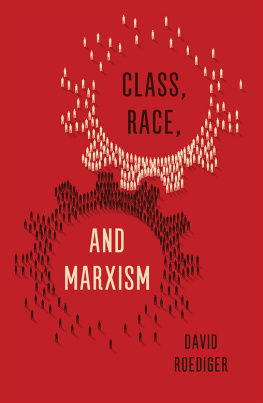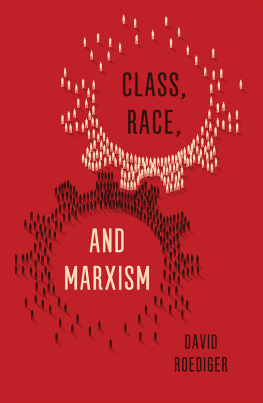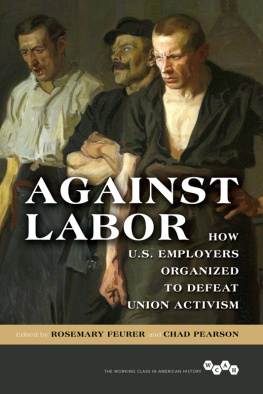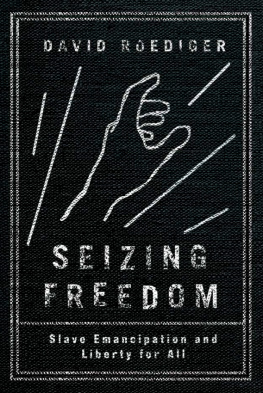THE
PRODUCTION
OF
DIFFERENCE

THE
PRODUCTION
OF
DIFFERENCE

RACE AND THE MANAGEMENT
OF LABOR IN U.S. HISTORY
DAVID R. ROEDIGER
ELIZABETH D. ESCH


Oxford University Press, Inc., publishes works that further
Oxford Universitys objective of excellence
in research, scholarship, and education.
Oxford New York
Auckland Cape Town Dar es Salaam Hong Kong Karachi
Kuala Lumpur Madrid Melbourne Mexico City Nairobi
New Delhi Shanghai Taipei Toronto
With offices in
Argentina Austria Brazil Chile Czech Republic France Greece
Guatemala Hungary Italy Japan Poland Portugal Singapore
South Korea Switzerland Thailand Turkey Ukraine Vietnam
Copyright 2012 by David R. Roediger and Elizabeth D. Esch
Published by Oxford University Press, Inc.
198 Madison Avenue, New York, NY 10016
www.oup.com
Oxford is a registered trademark of Oxford University Press
All rights reserved. No part of this publication may be reproduced,
stored in a retrieval system, or transmitted, in any form or by any means,
electronic, mechanical, photocopying, recording, or otherwise,
without the prior permission of Oxford University Press.
An early treatment of some of the material in this book appeared as Elizabeth Esch and
David Roediger, Race and the Management of Labor in U.S. History,
Historical Materialism 17 (2009), 343 and is used with the permission of the publisher
Koninklijke Brill NV, The Netherlands.
Library of Congress Cataloging-in-Publication Data
Roediger, David R.
The production of difference: race and the management of labor in U.S. History/
David R. Roediger, Elizabeth D. Esch.
p. cm.
Includes bibliographical references and index.
ISBN 978-0-19-973975-2 (hardcover: alk. paper)
1. Discrimination in employmentUnited StatesHistory.
2. LaborUnited StatesHistory.
3. Race discriminationUnited StatesHistory.
4. United StatesRace relations. I. Esch, Elizabeth D. II. Title.
HD4903.5.U58R636 2012
658.3008900973dc23 2011038641
1 3 5 7 9 8 6 4 2
Printed in the United States of America
on acid-free paper
In memory of
Derrick Bell
(19302011)
Troy Davis
(19682011)
Stetson Kennedy
(19162011)
Manning Marable
(19502011)
David Montgomery
(19272011)
ACKNOWLEDGMENTS

WE THANK LONG-STANDING mentors, scholars, and activists with whom we have exchanged writings and ideas on the concerns of this book over the years, and people whose examples have taught us. These include Venus Green, Yvette Huginnie, Shelton Stromquist, Peter Rachleff, Susan Porter Benson, Marvin Rosen, Pedro Cabn, Marcus Rediker, Jerry Tucker, Jennie Kassanoff, Herb Sloan, Eric Foner, Danny Widener, Robin Kelley, Michael Lacombe, Margaret George, Peter Linebaugh, Noel Ignatiev, David Montgomery, George Fredrickson, Nikhil Singh, Brent Edwards, Erin Small, Steve Downs, David Levin, Tom Bender, Catherine Sameh, Mike Rosenow, Josh Fraidstern, Rick Halpern, Philip S. Foner, Angela Davis, Lisa Lowe, Fred Thompson, Janet Jacobsen, James Barrett, Paul Garon, Gabriela Arredondo, George Rawick, David Noble, Kimberly Gilmore, George Lipsitz, Josef Barton, Matt Noyes, X Nate Mosley, Penelope Rosemont, Franklin Rosemont, David McNally, Don LaCoss, Blake Schwarzenbach, Karen Brodkin, Herbert Gutman, and Neferti Tadiar. In writing, we have benefitted from criticism, advice, and in some cases very generous sharing of research from Zachary Sell, Nick De Genova, Cheryl Harris, David Schley, Jeremy Wells, Victor Devinatz, Jake Mattox, Julie Greene, Augusto Espiritu, Faranak Miraftab, Robert Zeidel, Thomas Mackaman, Shawn Leigh Alexander, Rebecca Hill, Manu Vimalassery, Jennifer Guglielmo, Brian Kelly, and Kornel Chang. Martin Smith, Isaac Curtis, and Zachary Sell provided critical research assistance. Susan Ferbers editing greatly improved the book.
We are lucky to have had so many opportunities to present parts of this work over the past several years. We thank audiences, fellow conference participants, and organizers at University of Wisconsin-Milwaukee, Vanderbilt University, the Kirwan Institute at Ohio State University Conference on Structural Racism, Louisiana State University, University of Kentucky, Xavier University, University of Notre Dame, University of Copenhagen, Southern Illinois University, Mississippi State University, University of Maine, California State University at Long Beach, Highline Community College (Seattle) Dr. King Lecture, University of Pittsburghs E.P. Thompson Memorial Lecture, the Historical Materialism Conference at University of York, the Cordelia Beam Lecture at University of Iowa, University of Toronto, and the New Approaches to Capitalism and Imperialism in US History Conference at Harvard University. An early version of some arguments in the book appeared in Historical Materialism, which provided valuable editorial advice. We especially thank Jeff Webber and Sebastian Budgen for their roles in that process. Research leave was provided by the Center on Democracy in a Multiracial Society and the Center for Advanced Study at University of Illinois and the Special Assistant Professor Leave at Barnard College.
We thank librarians at University of Illinois, Columbia University, and Barnard College and the archivists and library staff at the Herbert Hoover Presidential Library in West Branch, Iowa, the Benson Ford Research Center at the Henry Ford, Dearborn, Michigan, the Oral History Collection at Columbia Universitys Butler Library; Special Collections at Tulane University; the John R. Commons Papers, State Historical Society of Wisconsin; and the Minnesota Historical Society.
Finally, as coauthors we also very much thank one other. The ideas that shaped this project emerged from many conversations over time and genuine collaboration. The emphasis on transnational work and capital and on taking the history of management seriously emerges from Elizabeth Eschs work, while that on slavery and on whiteness from David Roedigers. Neither of our initial emphases emerged unchanged, perhaps nowhere more clearly than in the necessity to think through the ways in which the choice of emphasis on a white identity by many workers was tragically conditioned by the coercions of capital.
THE
PRODUCTION
OF
DIFFERENCE

Introduction
Race in the History of U.S. Management
MR. BLOCK, THE CARTOONISH ANTIHERO of radical comics in the early twentieth century, had plenty of troubles. The thick-headed Block suffered constant indignities based on his mistaken belief in the good intentions of capitalists, politicians, cops, conservative union leaders, and labor contractors. Ernest Riebe, cartoonist and member of the Industrial Workers of the World (IWW), created Block to be stupid in an instructive sort of way, the prototypical unthinking white worker who had to learn about class to survive. But in supporting an organizing drive among Louisiana timber workers, Riebe not only had to make Mr. Block learn about race but also had to imagine that the antihero might not always be white. In the 1913 Mr. Block strip He Meets Others, Riebe shows workers in the Louisiana Piney Woods region as a most diverse group, a fact not lost on the boss. A suit-wearing manager circulates among a group of workers, drawn with slight variations to identify them as being of varied races and nationalitiesAnglo-Saxon, Irish, German, Italian, Chinese, Polish, and black. These various others are easily set against one another by the manager. The boss threatens and cajoles them to compete by appealing to masculinity, to fears of joblessness, and especially to their willingness to believe in racial and national differences among themselves. Management-by-race proceeds individual by individual in the comic, suggesting that the idea is is to keep competition alive by putting each individual worker on trial, racially and personally. By the last frame in Riebes strip, the manager is reclining serenely, successful in getting the men to work frantically while swapping racial slurs among themselves. Riebe shows race management to be crucial not only to the undermining of trade union unity and the lowering of wages but also to the very extraction of production from day to day. The cartoonist hopes that the high-stakes game will end favorably for labor when workers see through the strategy of the boss, but in the short run results are tragic.
Next page

